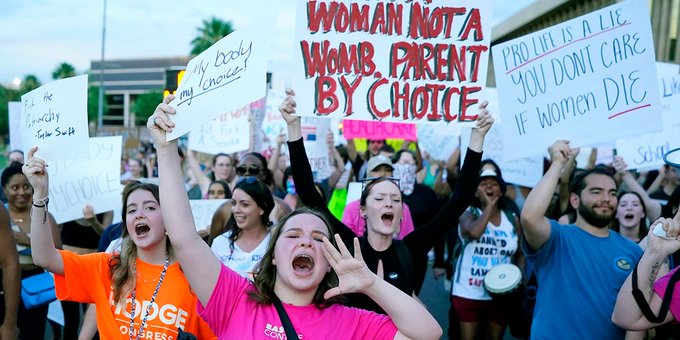The Arizona Supreme Court ruled to enforce an 1864 law criminalizing all abortions except when a woman’s life is at stake. With this ruling, Arizona is poised to join 14 other states in banning abortion at all stages of pregnancy.
Although enforcement of the ban won’t commence for at least two weeks, there’s uncertainty looming over the exact timeline, possibly stretching up to two months, as per an agreement stemming from a related case. Attorney General Kris Mayes and Planned Parenthood, the plaintiffs in the current case, have highlighted this aspect.
Critically, the law provides no exceptions for cases of rape or incest. As a result, experts anticipate a significant drop in the number of abortions in the state, from approximately 1,100 monthly to nearly zero. This projection is based on the outcomes observed in other states with similar total abortion bans.
The ruling has sparked intense reactions from various quarters. Arizona Senator Eva Burch, who disclosed having had an abortion due to non-viability of her pregnancy, criticized GOP lawmakers supporting the ban, emphasizing that the fight for reproductive rights in Arizona persists. Plans for a statewide petition campaign to address the issue in the fall have been mentioned.
Public opinion, as evidenced by AP VoteCast data from the 2022 midterm elections, indicates significant support for maintaining access to legal abortion, with six out of ten Arizona voters favoring it.
Planned Parenthood, a key provider of abortion services, has pledged to continue offering them for the limited time they remain legal. They also intend to bolster networks facilitating women’s travel to neighboring states like New Mexico and California for abortion access.
While some, like Arizona State University student Katarina White, celebrate the ruling, others like Brittany Crawford, a mother of three, express concerns about its ramifications. Crawford, who underwent an abortion at 18, emphasizes the importance of individual choice in reproductive decisions.
The Center for Arizona Policy, a staunch advocate of anti-abortion measures, welcomed the court’s decision, framing it as a recognition of the sanctity of human life.
Legal experts and medical professionals are grappling with the implications of the ruling. Planned Parenthood’s chief medical officer, Jill Gibson, notes the heightened legal risks for physicians, potentially influencing clinical decisions and patient care.
In the realm of politics, the ruling reflects broader trends seen since the U.S. Supreme Court overturned Roe v. Wade in 2022. Republican-led states have moved to enact stricter abortion laws, while Democratic-leaning ones have worked to safeguard abortion rights.
Arizona’s Attorney General Mark Brnovich, a Republican, played a pivotal role in pushing for the enforcement of the 1864 law, drawing criticism from his Democratic successor, Kris Mayes, who condemned the decision as regressive.
Former Arizona Governor Doug Ducey, also a Republican, expressed his dissatisfaction with the ruling, emphasizing the need for policies that foster consensus on such sensitive matters.
As Arizona braces for the implementation of this near-total abortion ban, the decision reverberates across legal, political, and social spheres, igniting debates over reproductive rights and individual freedoms.

















Comments